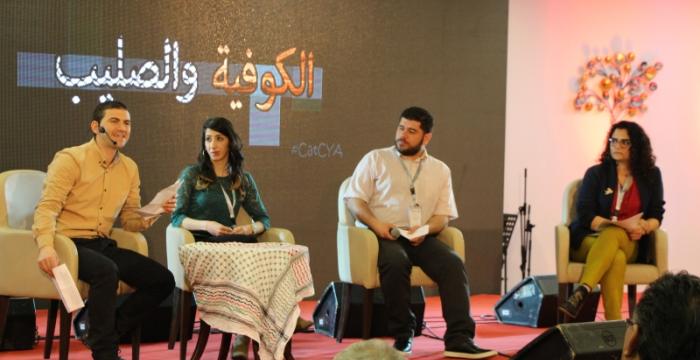
We Have the Future in Our Hands; A Young Palestinian Christian’s Voice

We Have the Future in Our Hands; A Young Palestinian Christian’s Voice
If you ask me about one thing that I have done in my life that I am most proud of, I would say—that day! The day I stood on the Christ at the Checkpoint stage with three inspiring friends, in front of hundreds of people, and telling them how this conference had changed my life, while also encouraging the upcoming generation to do something for their homeland. At that moment, as I spoke for my people, I realized that this country of conflicts and war has become my favorite place on earth! It is my honor to defend a nation that everybody else is abandoning.
The love of my homeland was rooted in my heart since I was a little girl. Becoming a believer in Jesus Christ was the hardest part of my Palestinian identity. As I understood it, being a Christian meant not talking about any kind of politics. Furthermore, as I read the Old Testament, it made me want to refuse God and my Christian faith. If God wanted the Jews to have the land (the land that belongs to my family) over my people’s dead bodies, destroyed homes and uprooted olive trees, I didn’t want that God anymore! I was confused between my Christianity and my feelings of patriotism–until Christ at the Checkpoint conference came to life.
This conference literally changed my life. It taught me that God also loves Palestine. Until then, I wasn’t sure He actually did, due to the painful situation that my homeland experiences every day. Through the conference, I learned that Jesus spoke against the sort of injustice we are living in. Most of all, I learned that God, who is living inside me, can teach me to love and accept my enemies without giving up my rights to live in this land!
Christ at the Checkpoint Young Adults
Since my first experience, I have been in love with the Christ at the Checkpoint conference. I love the idea, the message, the goals, and the impact that the conference is making around the world. But the conferences were in English, and I wondered why we did not discuss the same topics in Arabic. I remember at Christ at the Checkpoint 2014, one of the speakers asked how many locals were in the hall. He asked them to stand up, and I was so disappointed that only a few people in the room stood. This conference was making a big impact in my life, and I wanted to see it do the same for others. When I was asked to join Christ at the Checkpoint Young Adults committee, I accepted, because I want the message of Christ at the Checkpoint to touch more of my people in their own language.
The Committee
In November 2014, a group of us gathered to explore ways that young locals can contribute to Christ at the Checkpoint. We wanted to see young Palestinian Christians engaging in a forum that addresses our reality; both its challenges and opportunities. We were a group of 12 emerging leaders from Ramallah, Bethlehem, Gaza, Nazareth, Haifa, and Jerusalem who are active in our communities, representing various churches and ministries.
We had different stories and different challenges. Some of us are Palestinians living in the West Bank and we have our own challenges. Some of us are Palestinians who are living in Israel, and they have their own challenges. What gathered us is our love for our people and our land, and the knowledge that our faith that can change our reality.
Jack Munayer, a Palestinian Israeli committee member said, “I joined the CATCYA committee because I felt (like many other young adults) that I didn’t want to be a passive voice in light of the current changes and injustices that happen in our land. By joining the committee, I could contribute and address issues that young people face that are often misunderstood or not addressed well in the believing community. My decision to take action is not a choice—it is a duty.”
What did we do?
The first thing on our agenda was to find a name that suited our purpose. We want a name that would represent both our culture and our faith together. We came up with “Al-Kufiyi and the Cross.” Al-kufiyi is the Arabic word for the traditional scarf that Palestinian farmers used to wear while working in their land for protection from the hot or cold weather. The cross, on the other hand, represents our faith in Jesus Christ who died on the cross for our sins so that we can be called children of God.
We produced a mission statement: “To motivate Christian Palestinian youth to take an active role as followers of Christ in spreading justice and peace through discussing the challenges of our societies from a biblical perspective.”
And thus began our journey to implement the first Kufiyi and the Cross conference scheduled July 16-18, 2015.The conference was held in the new building of Bethlehem Bible College and we had 70 participants from different parts of Palestine and Israel. The speakers were all upcoming or existing leaders in the community and they covered an array of subjects, such as:The Christian, Kingdom, Society and Politics; Overview of the Palestinian Christians in History; Justice, Peace and Reconciliation from a Biblical Perspective; My Calling in my Land; Religious Extremism; Loving my Neighbor; Identity, Land, God’s People and Christian Zionism Theology; Immigration; Palestinian Christians and the Israeli-Palestinian Conflict.
Challenges we faced
Of course, we faced challenges preparing for the conference and finding young speakers—but God helped us! We wanted to have a conference for young people that would be presented by young people—and we succeeded in achieving our goal. It was inspiring to see some of the committee members step up to the challenge of studying and preparing for subjects they hadn’t dealt with before.
What we found after the conference is that most of the participants tended to separate their spiritual life from their everyday challenges. Many of us, as young Palestinian Christians, had passively accepted the idea that we should not talk about these challenges—and that if we attempted to address them we were being “nationalistic,” and not truly religious. Many of us felt that if we were to speak of politics, true faith would have no place in our lives. We had learned to keep Church and life’s challenges separated!
One of the greatest things this conference did is to help us see the importance of engaging in a biblical way with the challenges of our daily life and to know that God’s help is with us as we do so.
As for the international community, we were surprised—to say the least—that one of our videos that was done in Arabic to address local Palestinians was seen by a non-Arabic speaker who made assumptions concerning our motive and message. An article was circulated based on this person’s interpretation of a sequence of images and eventually came back to us. As a committee, we found ourselves under attack for trying to be contextual within our reality. We discovered how true it is that even when we try to target our own people, our message is twisted and manipulated by others.
The future is in our hands
I don’t want to see our Palestinian young adults leaving their homeland and search for an easier life in the West. In the West, we will only be a number in the midst of many others—but here we can make a change. Nobody needs us in the West, but our land and people need us here; they need our power and enthusiasm to make a change.
I want to see the younger generation loving God and their land, and having the courage to speak loudly against the occupation, the checkpoints and any kind of injustice they are living in. Despite this difficult situation, God has placed the future in our hands and we will not forget our responsibility. We have a little saying in Palestine, made famous by Palestinian poet, Rafeef Ziadiah: “We Palestinians wake up every morning to teach life, sir.” By God’s grace, we will continue to do so.
Amira is the Communications Coordinator of Bethlehem Bible College. She is a committed Palestinian Christian who has a passion for writing about the intersection of faith and seeking justice for her fellow countrymen. To read more of her writings sign up for Bethlehem Bible College’s monthly newsletter.

